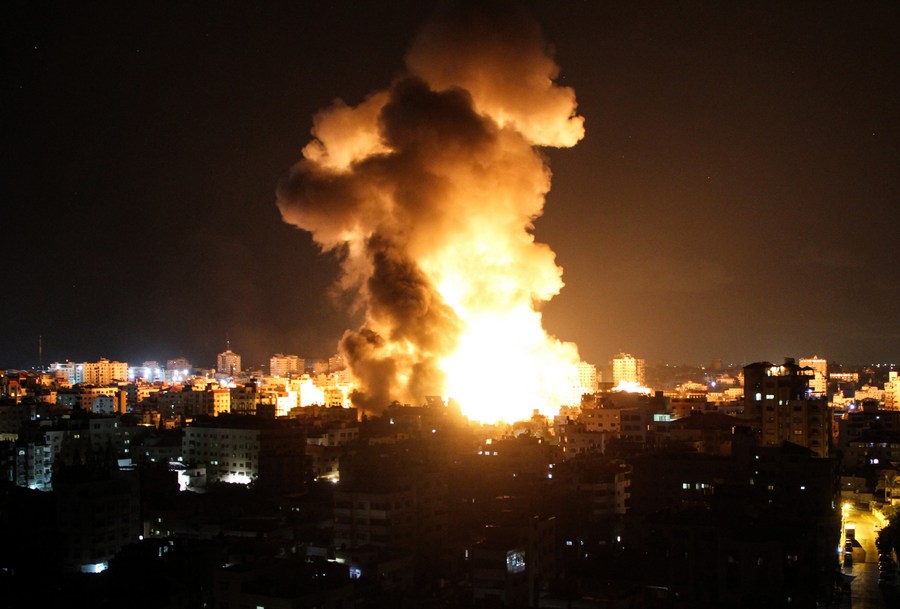Israel-Palestine conflict: History repeats but with some changes
- By Jin Liangxiang
 0 Comment(s)
0 Comment(s) Print
Print E-mail China.org.cn, May 21, 2021
E-mail China.org.cn, May 21, 2021

The latest round of Palestine-Israel conflicts has lasted for more than a week, which has become the focus of the international community. Despite the frequency of similar tensions, the new round of conflict shows some new features. Encouraged by the U.S., Israel has demonstrated a new level of aggressiveness, and people on both sides are paying the cost for biased U.S. policy.
History has seen many repetitions of violence between Palestine and Israel. Hamas of the Palestinian side shoot unsophisticated rockets at Israeli targets while Israelis fire at Palestinian targets with guided missiles, bombers and other sophisticated weaponry. There are casualties on both sides, and tens of thousands of Palestinians have fled their homes.
Despite the similarities, the differences are also obvious. One of the triggers of the latest conflicts is the settlement issue, which has existed for a long time. Israel has been building settlements on occupied Palestinian territories for many years, which is blatant violation against various U.N. Security Council resolutions and the broad international consensus. Previously, Israel built settlements on the occupied territories without people living on them, but this time, Israel's courts paved the way for the evictions of six Palestinian families from a neighborhood in East Jerusalem called Sheikh Jarrah. To put it another way, Israel has gone too far regarding the settlement issue this time.
The difference also lies in the intensity of Israel's military actions. Israel has not only destroyed military facilities of Hamas, but also office buildings of Hamas institutions, homes of civilians and even buildings hosting major international media organizations including the Associated Press and Al Jazeera, angering the international community.
Israel's ever more intensive military actions could be attributed to many reasons, but the most prominent one would be America's extremely biased approach toward the Palestine-Israel conflict, which has greatly encouraged Israel to take actions regardless of international public opinion. The new level of violence is largely due to new level of biased support on the U.S. side.
Former U.S. President Donald Trump had demonstrated the utmost of America's support for Israel. Trump, by moving the U.S. embassy from Tel Aviv to Jerusalem, formally recognized Jerusalem as Israel's capital, recognized Israel's annexation of settlements on occupied territories, and pushed some Arab countries to establish diplomatic relations with Israel. Previous U.S. presidents had hesitated to do all these actions.
President Biden seems to be much more sober regarding his policy toward Israel as he refrained from having a phone call with Israeli leader immediately after taking office. Only months later did he call Netanyahu, showing his distance from his predecessor. But it is difficult for him to reverse or scale back the high-level support for Israel. Pro-Israeli lobbyists and evangelicals will largely determine the efficiency and effects of his domestic and foreign policy and his political ecology as well.
An immediate ceasefire between Israel and Hamas is the most urgent action required to avoid more casualties and an even more serious humanitarian crisis. As major international actors were calling for a ceasefire, the U.S. has refused China's call in the U.N. Security Council for a discussion of the latest conflict several times, and has rejected issuing a statement from the Security Council about the conflict.
Antony Blinken, U.S. Secretary of State, and several other U.S. politicians did talk about concerns regarding the escalation of the violence, but they mainly talked about Israel's rights to defend itself but not that of the Palestinians.
The latest round of violence might be understood as a repetition of an old story, but the changes are also obvious. First, the tensions are fiercer in terms of weapons, damages and casualties. Second, America's biased approach toward the conflicts has reached a new level. With tensions likely entering a third week, more blood will be shed on both sides, particularly on the Palestinian side. Not only Palestinians, but also Israelis are paying the cost for U.S. policy.
Jin Liangxiang is Senior Research Fellow with the Center for West Asian and African Studies, Shanghai Institutes for International Studies. For more information please visit:
http://www.china.org.cn/opinion/jinliangxiang.htm
Opinion articles reflect the views of their authors, not necessarily those of China.org.cn.
If you would like to contribute, please contact us at opinion@china.org.cn.






Go to Forum >>0 Comment(s)